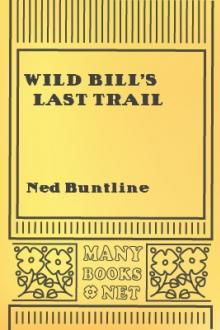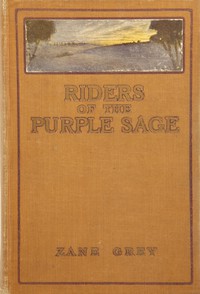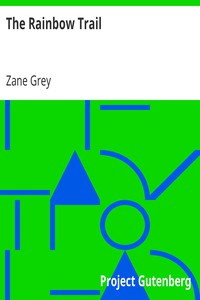The Heritage of the Desert: A Novel, Zane Grey [books for 9th graders .txt] 📗

- Author: Zane Grey
Book online «The Heritage of the Desert: A Novel, Zane Grey [books for 9th graders .txt] 📗». Author Zane Grey
Daylight showed Echo Cliffs to be of vastly greater range than the sister plateau across the river. The roll of cedar level, the heave of craggy ridge, the dip of white-sage valley gave this side a diversity widely differing from the two steps of the Vermillion tableland. August Naab followed a trail leading back toward the river. For the most part thick cedars hid the surroundings from Hare's view; occasionally, however, he had a backward glimpse from a high point, or a wide prospect below, where the trail overlooked an oval hemmed-in valley.
About midday August Naab brushed through a thicket, and came abruptly on a declivity. He turned to his companion with a wave of his hand.
“The Navajo camp,” he said. “Eschtah has lived there for many years. It's the only permanent Navajo camp I know. These Indians are nomads. Most of them live wherever the sheep lead them. This plateau ranges for a hundred miles, farther than any white man knows, and everywhere, in the valleys and green nooks, will be found Navajo hogans. That's why we may never find Mescal.”
Hare's gaze travelled down over the tips of cedar and crag to a pleasant vale, dotted with round mound-like white-streaked hogans, from which lazy floating columns of blue smoke curled upward. Mustangs and burros and sheep browsed on the white patches of grass. Bright-red blankets blazed on the cedar branches. There was slow colorful movement of Indians, passing in and out of their homes. The scene brought irresistibly to Hare the thought of summer, of long warm afternoons, of leisure that took no stock of time.
On the way down the trail they encountered a flock of sheep driven by a little Navajo boy on a brown burro. It was difficult to tell which was the more surprised, the long-eared burro, which stood stock-still, or the boy, who first kicked and pounded his shaggy steed, and then jumped off and ran with black locks flying. Farther down Indian girls started up from their tasks, and darted silently into the shade of the cedars. August Naab whooped when he reached the valley, and Indian braves appeared, to cluster round him, shake his hand and Hare's, and lead them toward the centre of the encampment.
The hogans where these desert savages dwelt were all alike; only the chief's was larger. From without it resembled a mound of clay with a few white logs, half imbedded, shining against the brick red. August Naab drew aside a blanket hanging over a door, and entered, beckoning his companion to follow. Inured as Hare had become to the smell and smart of wood-smoke, for a moment he could not see, or scarcely breathe, so thick was the atmosphere. A fire, the size of which attested the desert Indian's love of warmth, blazed in the middle of the hogan, and sent part of its smoke upward through a round hole in the roof. Eschtah, with blanket over his shoulders, his lean black head bent, sat near the fire. He noted the entrance of his visitors, but immediately resumed his meditative posture, and appeared to be unaware of their presence.
Hare followed August's example, sitting down and speaking no word. His eyes, however, roved discreetly to and fro. Eschtah's three wives presented great differences in age and appearance. The eldest was a wrinkled, parchment-skinned old hag who sat sightless before the fire; the next was a solid square squaw, employed in the task of combing a naked boy's hair with a comb made of stiff thin roots tied tightly in a round bunch. Judging from the youngster's actions and grimaces, this combing process was not a pleasant one. The third wife, much younger, had a comely face, and long braids of black hair, of which, evidently, she was proud. She leaned on her knees over a flat slab of rock, and holding in her hands a long oval stone, she rolled and mashed corn into meal. There were young braves, handsome in their bronze-skinned way, with bands binding their straight thick hair, silver rings in their ears, silver bracelets on their wrists, silver buttons on their moccasins. There were girls who looked up from their blanket-weaving with shy curiosity, and then turned to their frames strung with long threads. Under their nimble fingers the wool-carrying needles slipped in and out, and the colored stripes grew apace. Then there were younger boys and girls, all bright-eyed and curious; and babies sleeping on blankets. Where the walls and ceiling were not covered with buckskin garments, weapons and blankets, Hare saw the white wood-ribs of the hogan structure. It was a work of art, this circular house of forked logs and branches, interwoven into a dome, arched and strong, and all covered and cemented with clay.
At a touch of August's hand Hare turned to the old chief; and awaited his speech. It came with the uplifting of Eschtah's head, and the offering of his hand in the white man's salute. August's replies were slow and labored; he could not speak the Navajo language fluently, but he understood it.
“The White Prophet is welcome,” was the chief's greeting. “Does he come for sheep or braves or to honor the Navajo in his home?”
“Eschtah, he seeks the Flower of the Desert,” replied August Naab. “Mescal has left him. Her trail leads to the bitter waters under the cliff, and then is as a bird's.”
“Eschtah has waited, yet Mescal has not come to him.”
“She has not been here?”
“Mescal's shadow has not gladdened the Navajo's door.”
“She has climbed the crags or wandered into the canyons. The white father loves her; he must find her.”
“Eschtah's braves and mustangs are for his friend's use. The Navajo will find her if she is not as the grain of drifting sand. But is the White Prophet wise in his years? Let the Flower of the Desert take root in the soil of her forefathers.”
“Eschtah's wisdom is great, but he thinks only of Indian blood. Mescal is half white, and her ways have been the ways of the white man. Nor does Eschtah think of the white man's love.”
“The desert has called. Where is the White Prophet's vision? White blood and red blood will not mix. The Indian's blood pales in the white man's stream; or it burns red for the sun and the waste and the wild. Eschtah's forefathers, sleeping here in the silence, have called the Desert Flower.”
“It is true. But the white man is bound; he cannot be as the Indian; he does not content himself with life as it is; he hopes and prays for change; he believes in the progress of his race on earth. Therefore Eschtah's white friend smelts Mescal; he has brought her up as his own; he wants to take her home, to love her better, to trust to the future.”
“The white man's ways are white man's ways. Eschtah understands. He remembers his daughter lying here. He closed her dead eyes and sent word





Comments (0)